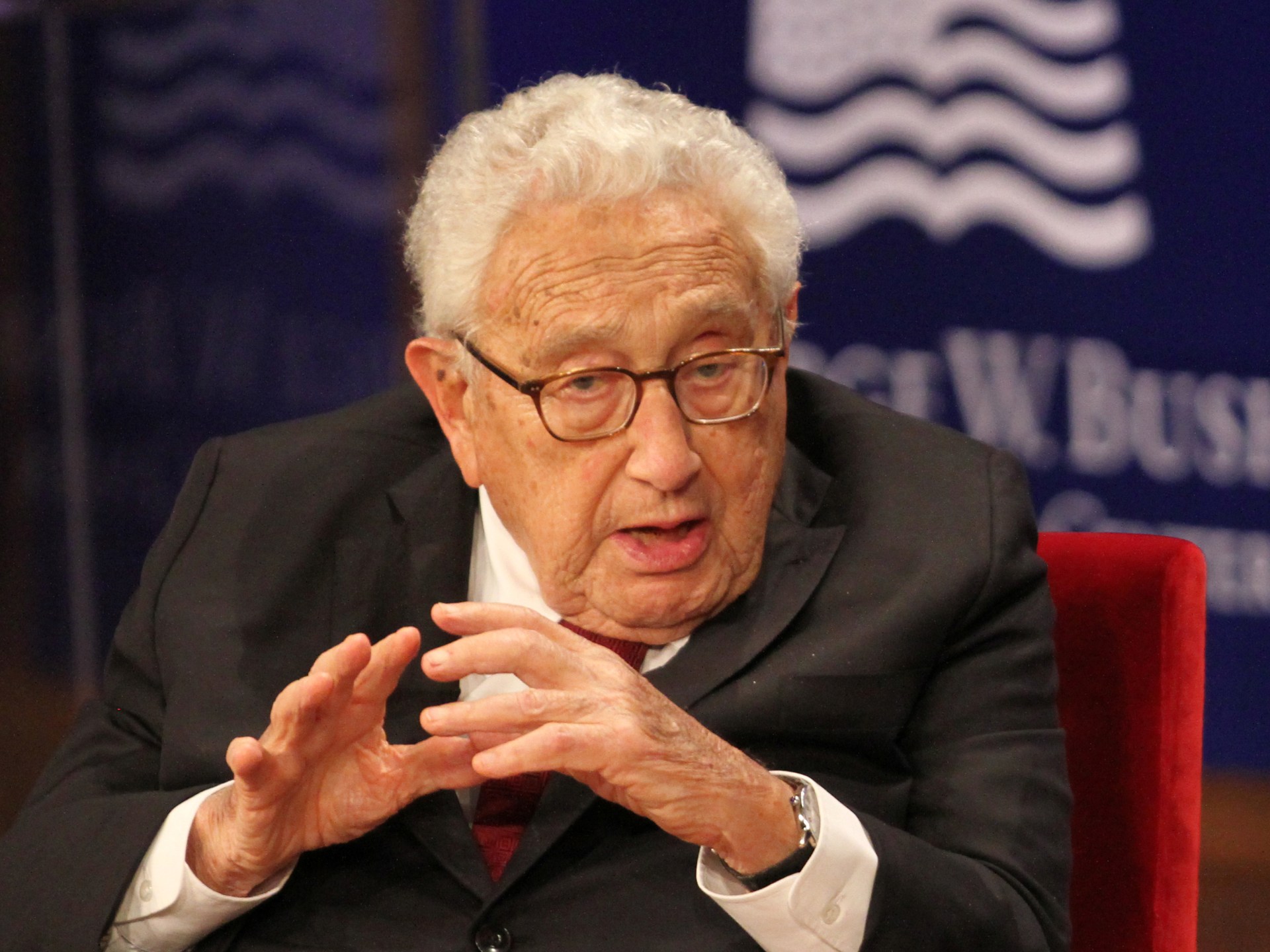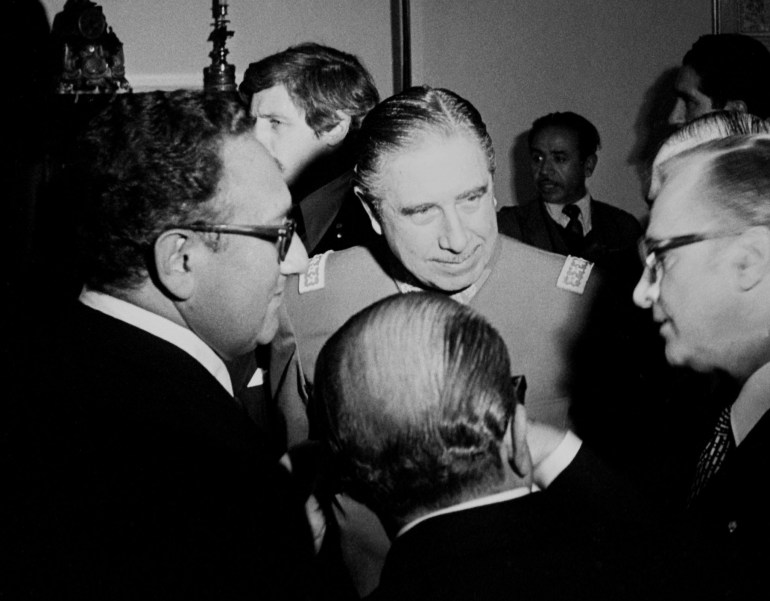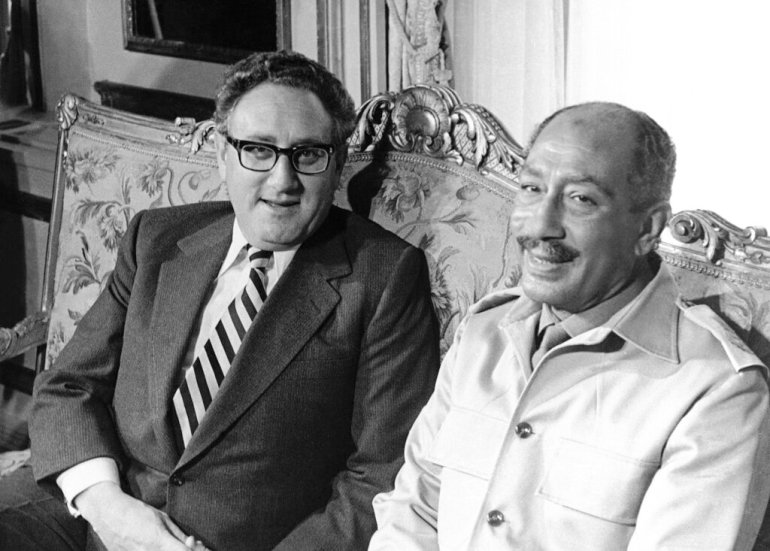
New York, United States – Few Nobel Peace Prize winners are described as warmongers, but the enigmatic, gravelly-voiced diplomat Henry Kissinger was.
The contradictions of Kissinger, the died on Wednesday Being at home in Connecticut at 100 years old isn’t all.
Kissinger, an academic turned celebrity, was a Jewish teenager who fled the Nazis, a self-professed “secret swinger” who dated pin-ups, a Machiavellian adviser to US presidents who changed the course of history , and a workaholic who remained active beyond his last birthday.
The debate over whether the former US Secretary of State was a wise advisor or a merciless hawk is unlikely to end any time soon. He served in this role under two presidents: Richard Nixon and Gerald Ford, both Republicans.
Kissinger’s work on China’s diplomatic opening to the USA, groundbreaking arms deals between the USA and the Soviet Union and peacemaking between Israelis and Arabs is undisputed. However, his role in the Vietnam War and his support of anti-communist dictatorships, particularly in Latin America, remain controversial.
“He looked at the world from 30,000 feet and represented broad interests and long-term goals in a way that underestimated the negative costs that people would bear, particularly in societies different from those of the United States,” Jeremi said Suri, a history professor at the University of Texas at Austin, told Al Jazeera.
In 2021, at the age of 98, Kissinger co-authored a book on artificial intelligence with former Google CEO Eric Schmidt and MIT computer scientist Daniel Huttenlocher.
“Henry Kissinger knew nothing about the digital world at age 90, even though he had many opinions about it,” Schmidt told podcast host Tim Ferris when the book was published.
“But he is mastering the digital world and artificial intelligence with the speed and speed of people who are just entering this world,” Schmidt said. “This is unique to him. It is a present.”
Kissinger’s son David Kissinger also emphasized his father’s unique longevity ahead of his 100th birthday celebration, which was also attended by current US Secretary of State Antony Blinken.
“Not only has he outlived most of his colleagues, major critics and students, but he has remained tirelessly active into his 90s,” the younger Kissinger wrote in the Washington Post in May 2023.
When asked about Blinken’s attendance at the party, State Department spokesman Vedant Patel pointed to the political “differences” between the two men. Still, he added, Blinken has had the “opportunity to engage with the former top diplomat” several times since taking office.
Kissinger’s life story has the elements of a classic US immigration success. He was born in Fürth, Germany, in 1923 to devout middle-class Jewish parents. Faced with the rising tide of anti-Semitism, they fled the Third Reich and settled in New York in 1938.
Kissinger served in the U.S. Army in Germany and took part in the crucial and brutal Battle of the Bulge. As a native German speaker, he was assigned to counterintelligence and received the Bronze Star for searching for former Gestapo officers.
He returned to the United States in 1947 to begin a celebrated academic career at Harvard University, which led to part-time advisory roles in the White House under Presidents John F. Kennedy and Lyndon Johnson and set him on the path of his life’s work.
A realist who criticized moralizing
Kissinger chided his colleagues for their Cold War-era moralizing and called for pragmatism. A “flexible response” to communist aggression would include the use of conventional and nuclear weapons as a deterrent rather than the threat of full-scale nuclear retaliation, he said.
“He built his fame by presenting and portraying himself as the epitome of the European realist, lent to an immature and naive America to teach it the strict and immutable laws of international relations,” said Mario del Pero, historian at Sciences Po in Paris. said Al Jazeera.
President-elect Richard Nixon made Kissinger his national security adviser in 1968. He began reshaping Washington’s foreign policy machine by bypassing the State Department and concentrating power in the White House’s National Security Council.
“Kissinger created a model for operating the machinery of a complex democracy to make strategic decisions that lacked public support but served the national interest. He was controversial, but his realpolitik influenced two generations of policymakers,” Suri added.
His preferred “back-channel” talks paved the way for a diplomatic opening with China as well as détente and the Strategic Arms Limitation Treaty (SALT I) with the Soviet Union. In foreign policy, Washington has “no permanent friends or enemies, only interests,” he once wrote.
His greatest challenge was a Vietnam War that by 1969 was becoming increasingly costly, deadly and unpopular. Kissinger sought “peace with honor” by opening talks with North Vietnam while using devastating bombing to increase his negotiating power.
The most fundamental problem in politics is not the control of evil, but the limitation of justice.
Henry Kissinger, former US Secretary of State
Kissinger’s plan extended the war by four years and included secret bombing campaigns in Laos and Cambodia that claimed the lives of 22,000 American soldiers and many more Southeast Asians and helped the genocidal Khmer Rouge seize power in Cambodia.
Revelations about Kissinger’s secret talks with North Vietnamese negotiators in Paris brought him notoriety. Journalists questioned his dating antics with model Candice Bergen, actress Jill St John and others. “Power is the ultimate aphrodisiac,” he replied.
Nobel Peace Prize
A ceasefire agreement in January 1973 won him the Nobel Peace Prize. That same year, his shuttle diplomacy between Israel, Egypt and Syria helped prevent the Yom Kippur War from escalating into a proxy confrontation between Washington and Moscow.
“He was the first prominent American diplomat: an iconic foreign policy figure who saved the world and brought peace, but who also appeared in People magazine sections and newspaper articles,” Thomas Schwartz, a historian at Vanderbilt University, told Al Jazeera.
“He was a swinger who dated beautiful women. All afterward were compared to him and lived in his shadow.”

This set the bar high for geostrategists to follow, from Zbigniew Brzezinski to Madeleine Albright to Condoleezza Rice. For some, however, Kissinger’s supposed brilliance was played up for effect.
“Much has been said of Kissinger’s genius and Bismarck-like realpolitik,” said del Pero, author of “The Eccentric Realist: Henry Kissinger and the Shaping of American Foreign Policy.”
“He has, of course, achieved successes during his time in office, but some of them – the opening to China, the SALT agreements with Moscow – were more or less inevitable and were already being tested under Johnson. The war in Vietnam was honorably prolonged in the search for a peace that was as chimerical as it was cynical.”
Kissinger Associates
Kissinger left office at the end of Ford’s term but continued to advise presidents, write about global relations and discuss Iraq, Syria, Ukraine and other wars on television. His secret company, Kissinger Associates, Inc., advises clients on business strategy.
His 1979 memoir “White House Years” won the National Book Award for history.
His ruthless pragmatism has come under increasing scrutiny, most notably by British-American journalist Christopher Hitchens in a 2001 book covering a war crimes prosecutor’s case, “The Trial of Henry Kissinger.”
Hitchens criticized Kissinger for bombing Cambodia, advocating the Indonesian occupation of East Timor and orchestrating the overthrow of Marxist Chilean President Salvador Allende in favor of right-wing dictator Augusto Pinochet.

Activists lobbied for arrest warrants and staged mock arrests against Kissinger. Another journalist, Seymour Hersh, spoke of his “dark side” but declined to prosecute.
“He has his own sentence; He has to live with himself,” Hersh said.
Schwartz, author of “Henry Kissinger and the Dilemmas of American Power,” is more sympathetic. Kissinger is best understood as a realist who defended a country that offered him a lifeline from the gas chambers and an Ivy League school.
“Because of his background in Nazi Germany, Kissinger was suspicious that elections did not always lead to liberal democracy but could lead to a different kind of popular election, mass rule and dictatorship,” Schwartz told Al Jazeera.
“He was attacked because he accommodated authoritarians, from the communist Chinese to Pinochet to Egypt’s Anwar Sadat. One can argue for the moral high ground, but history shows that it is difficult to bring humane democratic alternatives to countries where people fight bloodily over the stakes.”
Assessing Kissinger’s achievements is now a task for historians. For the father of two, morals have always been complex.
In his own words: “The most fundamental problem in politics is not the control of evil, but the limitation of justice.”

William Roberts and Joseph Stepansky contributed to this report.






Recent Comments